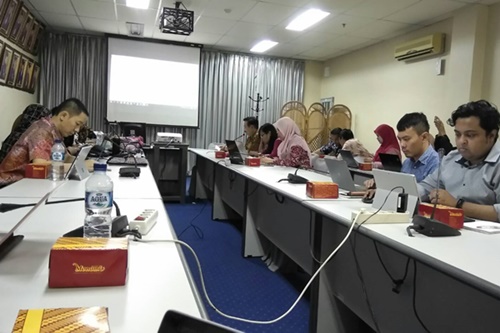Overcoming Barriers: Financing and Service Delivery for Vaccination in Fragile and Conflict-Affected States


The recent Indonesia visit is an illustration of iDSI’s ongoing commitment to building capacity in developing countries. HITAP visits help national bodies learn how to conduct Health Technology Assessments, strengthening decision-making processes and enabling gains in the quantity and quality of healthcare that a country can provide to its people. The location for this visit, the University of Indonesia, was beautiful; the tropical weather means greenery flourishes everywhere and palm trees line the roads.
The first hurdle in establishing HTA in health care decision making is always getting the needed political support. However clever or cost-saving, an initiative doesn’t have legs until policymakers believe its worth. Here, Indonesia is promising. The existence of an HTA committee in Indonesia which works closely with their Ministry of Health, and the committee’s partnership with HITAP both signal that broad political will to engage with HTA exists. The prevailing feeling during the three-day workshop was one of eagerness and excitement. Many of the members of the four Indonesian research teams working with HITAP are young graduates who are clearly passionate about pursuing HTA and are excited about the potential benefits that it can bring to their country. Participants were keen to use these days to learn from HITAP, and to pick up all of the advice that Dr. Yot Teerawattananon, senior researcher, and the team would share.
The eagerness can also be seen in the ambitious scope of the studies that the teams are trying to undertake. Four teams, one from the University of Indonesia, one from Gadjah Mada University and two from the Ministry of Health, are each conducting their own HTA studies. These projects require a multiplicity of skills as teams conduct systematic reviews, undertake modelling, analyse data using network meta-analysis, and carry out qualitative research. Given that Indonesia only first began to familiarise itself with HTA in 2014 these are big tasks and reflect the desire of the researchers to transform Indonesian health care and bring Indonesia up to the level of the regional leaders.
 However, discussions during our visit were a reminder that policymakers will always be cautious implementing something they aren’t familiar with. For those of us fully subscribed to the HTA bible, it’s easy to forget how significant a departure incorporating economics into medical decision making represents for many countries. For the senior members in the HTA committee, who have more experience in the established way of doing things, the feeling could be described as keen but cautious, eager to improve health systems but tentative about letting economists into the medical domain. Given that these people are responsible and accountable for safeguarding Indonesian healthcare this sentiment is entirely understandable and HITAP must continue to work to relieve any fears and prove that HTA can stand up to rigorous questioning.
However, discussions during our visit were a reminder that policymakers will always be cautious implementing something they aren’t familiar with. For those of us fully subscribed to the HTA bible, it’s easy to forget how significant a departure incorporating economics into medical decision making represents for many countries. For the senior members in the HTA committee, who have more experience in the established way of doing things, the feeling could be described as keen but cautious, eager to improve health systems but tentative about letting economists into the medical domain. Given that these people are responsible and accountable for safeguarding Indonesian healthcare this sentiment is entirely understandable and HITAP must continue to work to relieve any fears and prove that HTA can stand up to rigorous questioning.
 The visit also made clear that more work exists for HITAP to convey a broader notion of HTA. While the committee is on board with the benefits of quantitative cost-benefit analyses, there remains uncertainty around the importance of answering qualitative questions such as ‘why does a certain prescription pattern prevail?’ or ‘is excessive power in doctors’ freedom to prescribe seen as a problem?’. The answers to these questions are vital to designing policy which delivers the most benefit to the people and really tackles the root of problems. Lack of understanding around the role of qualitative research in Indonesia is currently threatening the future of some research projects being undertaken by the teams. While the HITAP visit went part way to allaying these reservations, there is still a way to go in conveying the holistic meaning of HTA. However, this is something that will come with time.
The visit also made clear that more work exists for HITAP to convey a broader notion of HTA. While the committee is on board with the benefits of quantitative cost-benefit analyses, there remains uncertainty around the importance of answering qualitative questions such as ‘why does a certain prescription pattern prevail?’ or ‘is excessive power in doctors’ freedom to prescribe seen as a problem?’. The answers to these questions are vital to designing policy which delivers the most benefit to the people and really tackles the root of problems. Lack of understanding around the role of qualitative research in Indonesia is currently threatening the future of some research projects being undertaken by the teams. While the HITAP visit went part way to allaying these reservations, there is still a way to go in conveying the holistic meaning of HTA. However, this is something that will come with time.